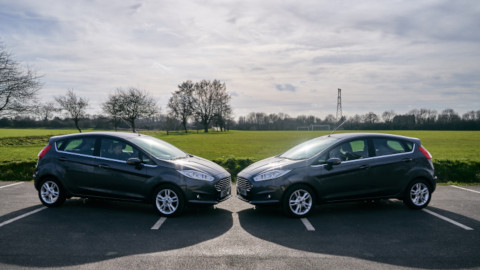Car Finance Terminology
Finance can be baffling as there are so many options to choose from and most documents are full of jargon that not everybody will understand.
The aim of this glossary is to help you understand some of the terms frequently used when discussing purchasing a used car through finance.
At CarStore, our Personal Advisors would like to offer helpful advice and be as transparent as possible so you fully understand the options available to you and everything makes clear sense.

Glossary
An acceptance fee is charged by the lender for the cost of setting up your finance agreement. It covers the cost of things like verifying your identity, running credit checks and other administration.
Also known as a finance contract or deal, an agreement contains everything you agree to do in order to borrow money from a lender to pay for your car.
It’s important to read your agreement in full before signing it, since it contains details about your obligations and rights.
Annual mileage is particularly important for PCP agreements because if you exceed the annual mileage you agreed to, you’ll need to pay the lender the excess mileage charge detailed in your agreement.
Also known as 'Annual Percentage Rate'.
APR refers to the amount of interest a lender applies to the money you borrow from them, each year. It’s a good way to compare different finance options, as a lender offering a lower APR is charging you less money for borrowing from them.
With any finance agreement, you always have a cooling-off period where you can change your mind about paying for your car with finance, without facing any fees or penalties. It lasts for 14 days, following the date you sign your agreement.
Normally, using your cooling-off period would mean that you can change your mind about paying by finance, but you would still have to find the funds to buy the car.
A credit report is a document that gives you loads of information about your credit history. It’s a good idea to check your credit report before applying for finance, since it will show you the information that the lenders you apply to will see, and give you a chance to correct any mistakes.
Your credit score is a points value that a credit reference agency gives to you. It’s based on your previous financial conduct, including things like:
- How much debt you currently have
- How much credit you have available to you
- Whether you’ve paid previous bills on time
Lenders use your credit score to determine how likely you are to pay back the amount you borrowed, on time and in full. You may find it difficult to obtain credit if your credit score is low.
Damage describes anything that worsens your car’s condition beyond expected wear and tear. This covers things like heavy scratches, dents, mechanical problems and broken glass.
If you pay for a car on a PCP agreement, the lender will normally expect you to repair any damage done to the car before you give it back to them at the end of your payment term.
A deposit is the amount of money that you'll pay upfront to secure a car finance agreement. The larger your deposit, the lower your monthly repayments will be.
Finance is an agreement between you and a lender. The lender agrees to pay the total cost of something you would like to buy immediately (like a car) and you agree to pay the lender back over a period of time. You'll benefit by getting your dream car straight away, and the lender benefits by charging you interest on the cost of the purchase.
Also known as a 'balloon payment' or 'optional final payment'.
If you choose to pay monthly for your car with a Personal Contract Purchase (PCP) deal, the lender will guarantee the amount of money your car will be worth at the end of the agreement. It’s also the amount of money you’ll be required to pay at the end of the agreement if you would like to become the legal owner of the car.
HP is a form of car finance that's likely to suit you if you don’t want a restriction on your annual mileage and would like to eventually own the car.
See also: APR
Interest is the amount of money that a lender charges you for borrowing from them.
Late payments are payments made outside or after of an agreed period of time. You’ll want to avoid these as many lenders charge a fee if you can’t pay your monthly payment on time and you may find it difficult to get credit in the future as a result.
If you get into any financial difficulty and are struggling to pay on time, it’s best to get in touch with your lender and work out a plan together.
The legal owner is the person or organisation that paid for the car. If you take out a finance agreement to pay for your car, the lender will almost always be the legal owner of the car. This can be important to remember when you apply for insurance, since some insurance companies need to know who the legal owner is.
A lender is a person or organisation that you borrow money from in order to pay for your car.
Negative equity describes a situation where the car’s market value is lower than the amount of money you owe the lender. It means that, even if you sold the car, you'd still owe the lender money because the funds from the sale wouldn’t cover what you owe.
Negative equity won’t be a problem if you make all the repayments in your agreement. However, because most cars depreciate in value, negative equity can become a problem if you choose to end your agreement early.
This is a fee charged by a lender at the end of a Hire Purchase or Personal Contract Purchase agreement. It covers the cost of transferring the legal ownership of the car to you.
Overpayment is where you pay more money back to a lender than you’re obligated to within a month. It’s a good thing to do if you can afford it, since it’ll reduce the amount of money you owe the lender faster. Some lenders allow this where others don’t, so check your agreement to see if you’re able to overpay.
Part exchange is where you pay for part of your new car using the value of your current one. We make this super easy, just enter your car’s registration number into our Sell Your Car page to see how much your car's worth.
Pay monthly is another term for finance. It refers to paying for your car in monthly instalments rather than in a single payment.
A payment holiday is where a lender allows you to take a break from your repayments. This can be useful if you encounter sudden, temporary financial difficulty. Check your agreement to see if your lender allows this and see how it works.
The registered keeper of a car is the person who has the right to use it and is legally responsible for it.
If you take out a finance agreement, you will be the registered keeper of the car until you’ve paid all your repayments and any option to purchase fees – at which point you’ll become the legal owner of the car as well.
The settlement figure is the total amount of money you need to pay to the lender in order to end your finance agreement.
Term refers to the amount of time (or number of months, usually) your finance agreement will last.
Wear and tear describes very light damage caused to a car through normal and reasonable usage. It’s reasonable to expect that a car’s paintwork would have a couple of extra light surface scratches after a year of driving, but it’s unreasonable to expect a car to have a dent in the bodywork (which would be classed as damage).
If you take out a PCP agreement, you need to make sure that the car’s condition is within the standards that you and the lender agreed to at the start of the agreement, or you risk charges at the end (if you return the car).
Finance your next used car your way
If you feel confident that you know what you want from a car finance agreement, then you can go right ahead and arrange your finance online with CarStore. It's simple, easy and quick to do.
However, we know that you may want someone to help you understand everything that's involved with finance. Our personal advisors will be happy to listen to your individual requirements and present you with all the information using plain, jargon-free language.
Talk to us online, over the phone or contact a CarStore Centre with any questions you may have.





